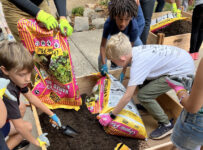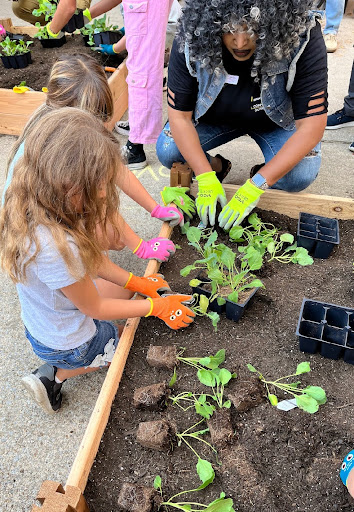
Virginia-Highland Elementary cultivates student learning with new STEAM garden – the Southerner Online
Since the opening of Virginia-Highland Elementary School in 2023, it has focused on a STEAM-specific curriculum. A relatively new way for students to further their STEAM education was introduced when the school first opened a student-grown garden.
The garden was brought to life as a result of a partnership the school made with the nonprofit organization Captain Planet Foundation and Dematic, a logistics and automation supplier. The school was awarded a learning grant to fund it, called Project Learning Garden. There are over 600 Learning Garden projects over the country.
“The garden is a fun and engaging way for students to gain real world knowledge and experiences,” said Thomas Freeman, Virginia-Highland first grade teacher and project helper. “Helping with the garden will teach them a lot of things about growing their own food and maintaining [a garden], as well as managing an organization, since keeping up the garden should be a team effort between [the students] and their classmates. We’re super excited for this opportunity.”
Every student at VHE is able to participate in activities around the garden, whether it be helping actively maintain the garden or learning what needs to be done to sustain it in the future.
“It’s a project-based learning initiative, which means students will work depending on their grade on different projects revolving around the garden,” Freeman said. “For example, the fourth and fifth graders will focus on what will sustain the garden in urban climates. Since we live in the city, the garden is technically an urban garden, so it has different specific needs, which is what the kids will learn.”
All projects involving the garden are based on sustainability.
“Students will be instructed to use sustainable practices to engage with the garden in an impactful and grounding way,” Virginia-Highland STEM coach Jessica Correa said. “We are hoping to focus on sustainability, especially in relation to food, and the importance of the products they are growing.”
Students at school discard fruits and vegetables more than anything else, representing over 50% of their food waste. A key part of food sustainability is avoiding waste as much as possible.
“With this garden, we will hopefully get kids more excited about eating healthy and the benefits of fruits and vegetables,” Correa said. “Having fresh ones that they grow themselves should help with that. Getting them interested in the produce they’re growing will tie in to encouraging them to eat their fruits and vegetables, and teach them to minimize their waste.”
The students won’t just be eating the food straight from the garden. Part of the experience will be learning how to take the base produce and turning it into different, more interesting foods.

“A big future goal with the garden is to have it eventually become a farm-to-table organization,” Freeman said. “The kids will learn how to turn the raw produce they are growing into items they’re more likely to recognize and have interest in. For example, helping them turn the basil they grew into tomato sauce. Then, we can have them share it with other students throughout the school, which will really bring everyone together and promote the garden.”
Along with focusing on sustainability, a major goal of the garden is allowing the students to work together to maintain it.
“Executive functioning is one of the biggest things we will be teaching the kids, which involves splitting up jobs, managing tools and staying on track,” Freeman said. “They will have to learn how to engage with each other and work together to maintain a shared space.”
The garden currently holds a variety of different products, such as flowers and carrots. Students plant the seeds for these plants themselves during workshops in class.
“It’s such a good opportunity for them because they get to learn about where their food really comes from, and they get to literally put the seeds in the ground and watch them grow,” Correa said. “Then they get to learn the importance of giving back since we’ll likely find a way to have them share the food they grow with the rest of the community.”



